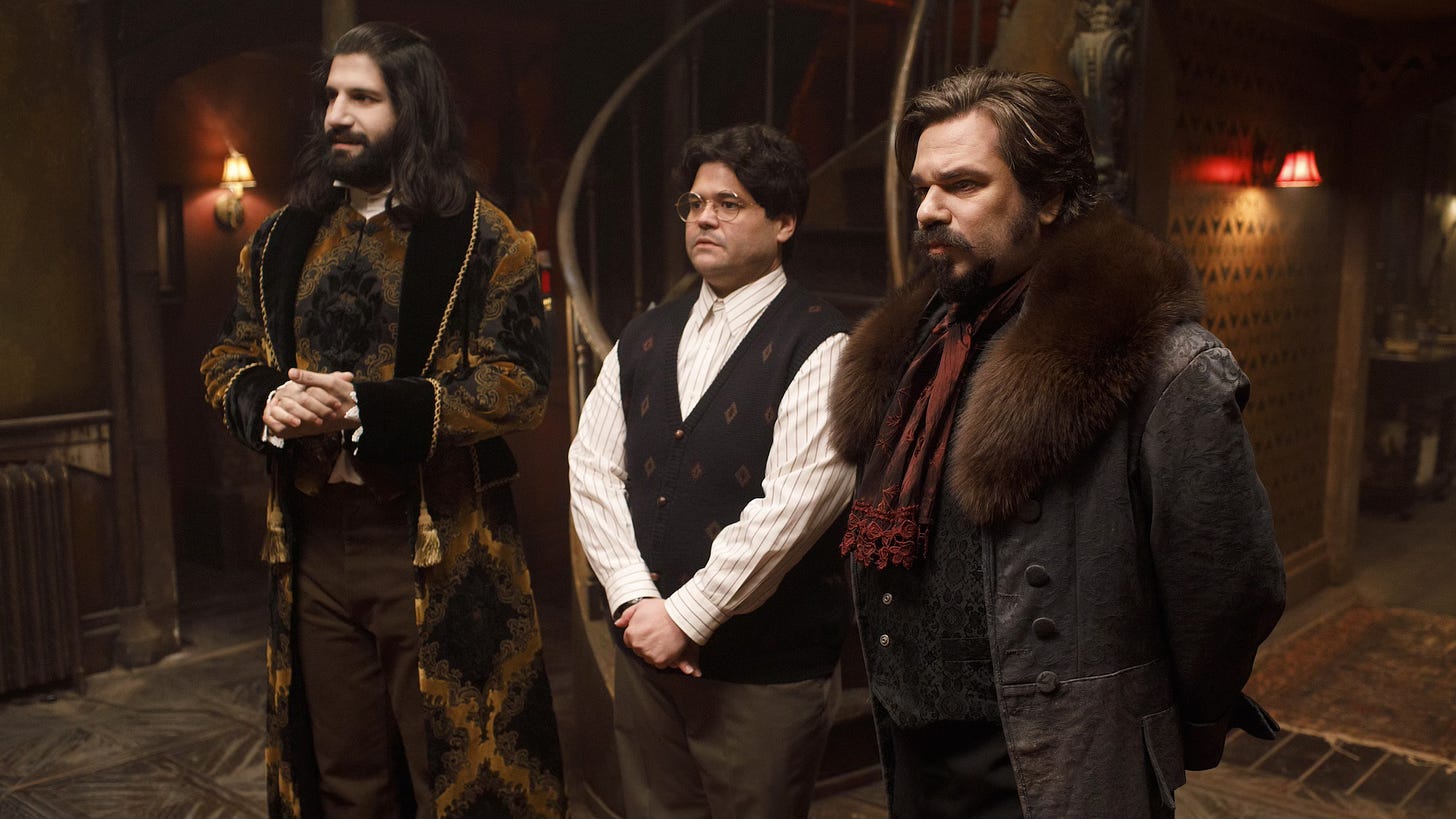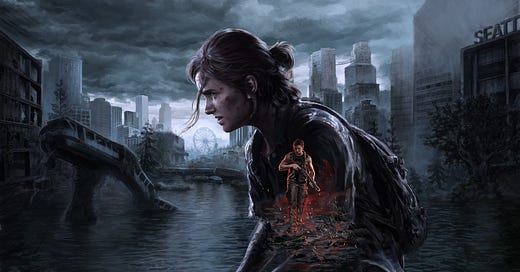
A Game You Can't Win
Some thoughts on how 'The Last of Us Part II' uses its existence as a video game to tell a unique story.
[Major spoilers ahead for The Last of Us and The Last of Us Part II]
Halfway through playing The Last of Us Part II Remastered, I started wondering, “Is this all there is?” I had heard all of the critical acclaim, and certainly, from a technical standpoint, Naughty Dog’s beloved video game was a wonder to behold. As I noted in last week’s newsletter, I would be perfectly content to wander around its post-apocalyptic wasteland without any of the headaches of fighting zombies or scavengers. But as a story, I started to wonder if there was anything deeper here than a standard revenge tale.
The game makes a bold move up front by having a new character, Abby (Laura Bailey) murder Joel (Troy Baker), one of two protagonists from the first game. This sets the first game’s other main character, Ellie (Ashley Johnson), on a mission of revenge to take out Abby and her crew. Then, at a moment of confrontation between Abby and Ellie, we cut back three days, and now Abby is the playable character. The idea here of seeing the humanity of your supposed enemy, the cycle of vengeance destroying everything it touches, and the inability of humanity to thrive if it only exists on recriminations, are all fine concepts, but they’re not surprising. The revenge narrative falls into a standard, “dig two graves” plot where the cost of revenge is so high that it can never achieve the justice it seeks.
So why is this revenge narrative worthwhile? Because it’s being told within a video game.
The developers at Naughty Dog and director Neil Druckmann are all well aware of how video games operate, especially at the “AAA” level where the most expense goes into making players feel empowered and immersed. More importantly, games typically hold the promise of victory. You reach the end of the story having conquered, improved, leveled up, and defeated the big bad. The first game cleverly eschewed such an easy conclusion with Joel lying to Ellie to preserve the bond they share (more on that in this issue I wrote in October 2022).
The Last of Us Part II goes a step further by inverting the entire notion of player-as-hero. The first game presented a brutal world, but we largely got to see Joel and Ellie operating as good people within it. Zombies were obviously monsters, and the human scavengers were ruthless and cruel, unlike our heroes who were on their way to possibly find a cure for the zombie plague. Part II lulls you into thinking that once again, you are on the side of the angels. It even sets up a clear path for you—take out Abby’s crew (aka mini-bosses) before you reach her (the big boss).
By circling back and changing the protagonist to Abby, the game not only shows the commonality between Abby and Ellie but discards the notion that just because you’re the player, you’re automatically heroic. When you once again reach the confrontation scene between Abby and Ellie, you’re now playing as Abby, the person you assumed was the villain, and realizing that this is far from the black-and-white story the first act led you to believe you were playing. Now you’re trying to defeat Ellie, the character we assumed was our hero, and now we’re not so sure.
When the game shifts back to Ellie’s perspective, we see a young woman so traumatized by her inability to avenge Joel’s death that she can’t let go of her revenge quest even though she’s found happiness with Dina (Shannon Woodward) and their son JJ. She chooses to leave that happiness behind because she feels compelled to kill Abby, and even upon finding Abby in a pitiable state and with no will left to fight, Ellie won’t show mercy. It’s a big “are we the baddies?” moment. Throughout the game, while we may not necessarily find ourselves allied with Abby, we also know that Ellie, by killing almost all of Abby’s friends, has certainly extracted a price in blood. Furthermore, through the way the relationships pan out with Abby now serving as protector to a young boy, Lev (Ian Alexander), Ellie is now confronting a similar dynamic to what she had with Joel.
Although there’s no shortage of revenge stories in other mediums, The Last of Us Part II uses its language as a game to reverse your point of view and hammer home the futility of revenge by making it so that winning is impossible. If you kill Abby, you’re damned. If you let her go, Joel is never avenged. The game cleverly compromises between the two by having Abby and Ellie fight, Ellie losing two fingers in the brawl, and then Ellie deciding at the last moment to let Abby go. When Ellie returns home, Dina and JJ are gone (Dina refusing to stay with someone who values revenge more than domestic bliss), and now minus two fingers, Ellie can’t play the guitar, an act that bonded her to Joel because he taught her how to play. She has lost a piece of herself both literally and figuratively. That’s where the game ends—you may not have become a total monster, but you lost what matters most. You can finish The Last of Us Part II, but you can’t win it.
What I’m Watching

My wife and I have become obsessed with What We Do in the Shadows. It’s a show we always figured we would like, but its blend of dark comedy and weirdness has made it our go-to binge at the moment.
We’re very slowly making our way through the second season of The Lord of the Rings: The Rings of Power. While I think we enjoyed Season 1 more than most, it was disheartening to reach the Season 2 premiere and see the writers once again pump the brakes. The whole culmination of Season 1 was, “We’re ready to go! Sauron is revealed! Let’s get moving!” and now we’re back at a crawl where we had to endure about 20 minutes of prologue explaining how Sauron disguised himself in the first place. I’m hoping that the second season will pick up, but the storyline with the elves is particularly weak (Elrond basically committed treason in the season premiere, and in the second episode they’re asking him to lead a mission?). The only one that feels like it’s connecting at all is “The Stranger” (aka clearly Gandalf) and the halflings in the desert because they’re endearing characters with a clear mission. Everything else in the show feels like playing for time.
What I’m Reading
I finished The Power Broker! It was amazing! My brain still feels exhausted! Without question one of the most enriching books I’ve ever tackled, but it did exact a toll. When it comes to reading now, I think I’m going to take it slightly easier. I’m making my way through Best Movie Year Ever and I’m also finishing up A Clockwork Orange (a relatively short novel although it can feel like a bit of an uphill climb at times due to Brugess’ distinctive prose that goes heavy on his invented slang).
What I’m Hearing
I’ve been saving this 99% Invisible series on The Power Broker until I finished the book, so now I’m diving into it. It makes me feel like I’m part of an exclusive club. Granted, it’s an exclusive club of dorks who would read 1200 pages on urban planning in New York City in the 20th century, but an exclusive club nonetheless.
What I’m Playing
I cannot get over how much fun I’m having with Astro Bot. I boot it up and I just feel joy watching my little robot friend jump around various worlds. If you have a PlayStation 5 and don’t get this game, I do not understand you.





